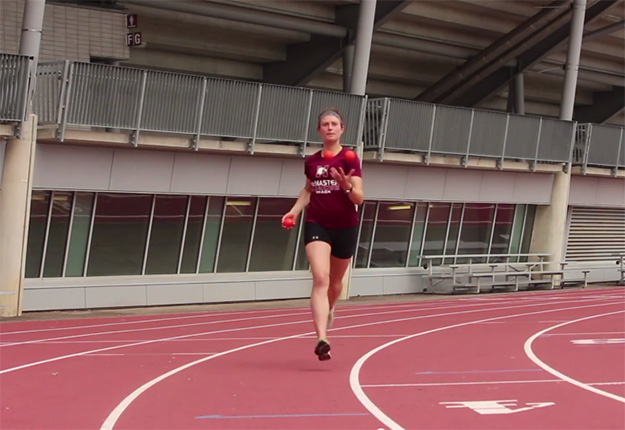When it comes to running, this PhD student is all hands

Eyes on the prize. PhD chemistry student Gabrielle Foran holds multiple world records in three-ball joggling, a unique sport that involves juggling three road hockey balls while running on a track.
Gabrielle Foran is like all busy graduate students, juggling lab time, teaching, running with McMaster’s track team and … three road hockey balls?
Foran can often be seen on campus practicing her joggling — a sport that combines running with juggling.
And yes, it’s a real thing.
Although the PhD chemistry student has run competitively for 11 years, it was only during her Master’s degree at the University of Guelph that she decided to try her hand at joggling.
One of her friends convinced her to join Guelph’s student juggling club first. Then, after getting a handle on the throw-and-catch, Foran entered her first joggling competition in 2013. Her experience in competitive running gave her an edge.
Since then she has garnered multiple world records in three-ball joggling.
This past weekend, she added one more to her list when she competed in the Guelph 5K Joggling Championships. Fellow track team member and multimedia student Maxine Gravina filmed the attempt — made more challenging because jogglers took to the road instead of the more predictable running surface available in a stadium setting.
“When I first saw Gabrielle, I wasn’t sure what to think,” says Gravina. “First, you need to master juggling, then you need to be able to move forward as you juggle. Then you need to move forward while running? I haven’t seen anyone else here who is able to do it.”
Ready to try something new
Foran’s love of a challenge extends beyond sport.
She spends her days in the lab of associate professor Gillian Goward. Foran’s research is focused on how protons move in fuel cell membranes — more mobile protons mean more conductive membranes. Improving the conductivity of these fuel cells, which are used in vehicles and industrial power generation, will make the cells more efficient and the technology more cost effective.
She says that Goward’s cutting edge research using nuclear magnetic resonance (NMR) technology is the reason she wanted to complete her doctorate at McMaster.
“When I was looking at research at different schools, I thought this research was really interesting. Also, one of my goals was to work in a new area of chemistry doing work that I have little to no experience with — that would be NMR.”


